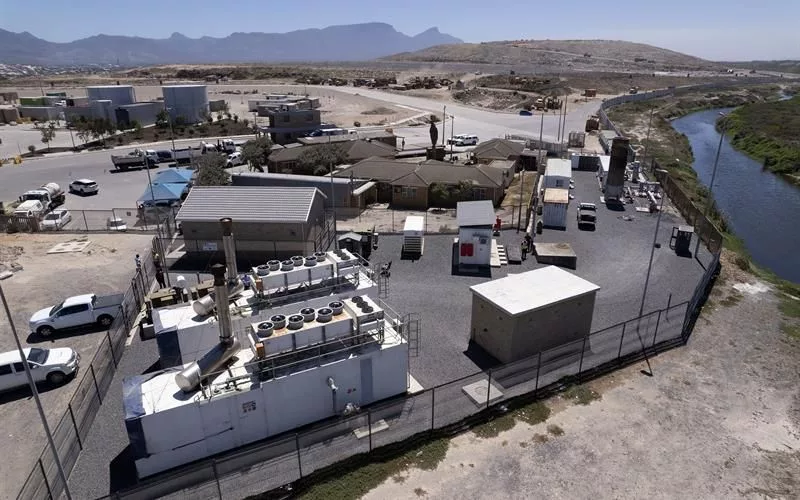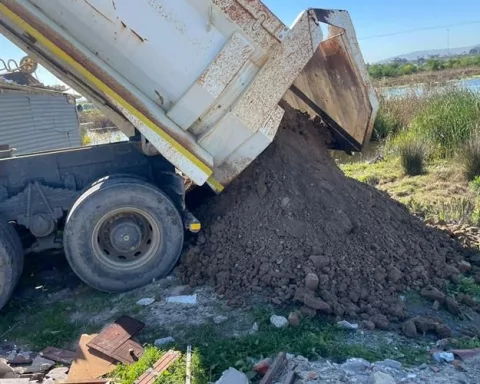Cape Town is leading the way in waste management by converting landfill gas into electricity through an innovative waste-to-energy project. The project involves drilling pipes into the landfill site to channel the gas to motors where it is used as fuel to generate electricity. The initiative is set to produce 15 million kWh annually and will earn the city ‘Carbon Credits’ which can be traded to fund additional projects that mitigate the health and pollution ramifications of waste. This project serves as an inspiring model of urban resilience and creativity, marking a step towards a greener, more resilient city.
Cape Town is leading the way in waste management by converting waste into electricity through a waste-to-energy project. The project involves drilling pipes into the landfill site to channel landfill gas to motors where it is used to generate electricity. The initiative is set to produce 15 million kWh annually and will also earn the city ‘Carbon Credits’ which can be traded to fund additional projects that mitigate the health and pollution ramifications of waste. This project serves as an inspiring model of urban resilience and creativity.
Nestled at the apex of the African continent lies the radiant city of Cape Town, which has recently made an audacious move towards a greener future. The daring initiative? Utilizing waste to generate electricity. This trendsetting project, led by Cape Town’s Urban Waste Management and Energy Mayoral Committee, has the potential to transform our perceptions and methods of waste management.
The Groundbreaking Initiative
In February of this year, the committee carried out an inspection on the Coastal Park landfill site. This site is not merely a dump for waste, but rather a hotbed for an avant-garde waste-to-energy project intent on producing electricity from the burning of landfill gas. The landfill gas, mostly comprised of methane, is produced from the breakdown of organic waste such as food residuals in the oxygen-deficient landfill environment.
The complex mechanism set up to transform this gas into electricity involves drilling ‘wells’ or perforated pipes into the landfill site. These pipes siphon the landfill gas and channel it to specially-designed motors where it’s used as fuel to generate electricity—a significant innovation in waste management indeed.
The Preparations and Potential
Before the motors can spring into action, the project must comply with various regulatory processes and install a specialized thermal mass flow meter. The procurement of essential spare components for the motors is also in the pipeline. These detailed preparations mark the dawn of electricity production expected to begin in the latter part of 2024—provided there are no unforeseen obstacles.
Once fully operational, this project is set to produce an impressive 15 million kWh annually. The majority of the electricity generated will be utilised in operational tasks and equipment at the landfill site, including a new recycling facility currently under construction.
More than Just Power Generation
However, the project’s ambitions don’t end with electricity generation. This inventive system will also enable the city to earn ‘Carbon Credits’ through the United Nations Framework Convention on Climate Change approved Clean Development Mechanism and the Paris Agreement’s replacement Article 6.4 mechanism.
To break it down, these carbon credits are awarded for each metric ton of carbon dioxide or its equivalent removed from the atmosphere. These credits are of significant value and can be traded to governments or businesses looking to decrease their carbon footprints, either for regulatory adherence or ethical reasons.
Cape Town aims to sell these carbon credits and use the proceeds to fund additional projects that could mitigate the health and pollution ramifications of waste. These initiatives are set to generate a wave of benefits for the local community.
During his visit to Coastal Park, Alderman Grant Twigg, the city’s Mayoral Committee Member for Urban Waste Management, expressed his pride and commitment to sustainable practices. He highlighted that the progress made in transforming landfill gas into electricity indicates a step towards a greener, more resilient city.
A Part of a Bigger Plan
This project, a symbol of Cape Town’s inventive spirit, is a component of the city’s new Energy Strategy. The strategy aims to exploit the energy resources available within the municipal boundary and adjacent areas. The city is not only probing into waste-to-energy projects but is also investigating ground-mounted, rooftop and floating solar, wind, gas, biosolids and sludge beneficiation, and small hydropower turbines, as revealed by Councillor Beverley van Reenen, the city’s Mayoral Committee Member for Energy.
Cape Town’s waste-to-wattage project serves as an inspiring model of urban resilience and creativity. It signifies a paradigm shift in our understanding of waste, from being an issue to becoming a solution. This transformative change, originating in the heart of one city, has the capacity to influence numerous others, directing them towards a more sustainable, resilient, and energy-efficient future. It’s a journey that’s worth watching, learning from, and perhaps, adopting.
1. What is Cape Town’s waste-to-energy project?
Cape Town’s waste-to-energy project involves converting landfill gas into electricity by drilling pipes into the landfill site to channel the gas to motors where it is used as fuel to generate electricity.
2. How much electricity is the project expected to produce annually?
The project is set to produce 15 million kWh annually.
3. What are Carbon Credits?
Carbon Credits are awarded for each metric ton of carbon dioxide or its equivalent removed from the atmosphere. These credits can be traded to governments or businesses looking to decrease their carbon footprints, either for regulatory adherence or ethical reasons.
4. How will Cape Town earn Carbon Credits?
Cape Town will earn Carbon Credits through the United Nations Framework Convention on Climate Change approved Clean Development Mechanism and the Paris Agreement’s replacement Article 6.4 mechanism by removing methane gas from the atmosphere.
5. What will Cape Town do with the proceeds from selling Carbon Credits?
Cape Town aims to use the proceeds from selling Carbon Credits to fund additional projects that mitigate the health and pollution ramifications of waste.
6. What is Cape Town’s Energy Strategy?
Cape Town’s Energy Strategy aims to exploit the energy resources available within the municipal boundary and adjacent areas. It includes waste-to-energy projects as well as investigating ground-mounted, rooftop and floating solar, wind, gas, biosolids and sludge beneficiation, and small hydropower turbines.












